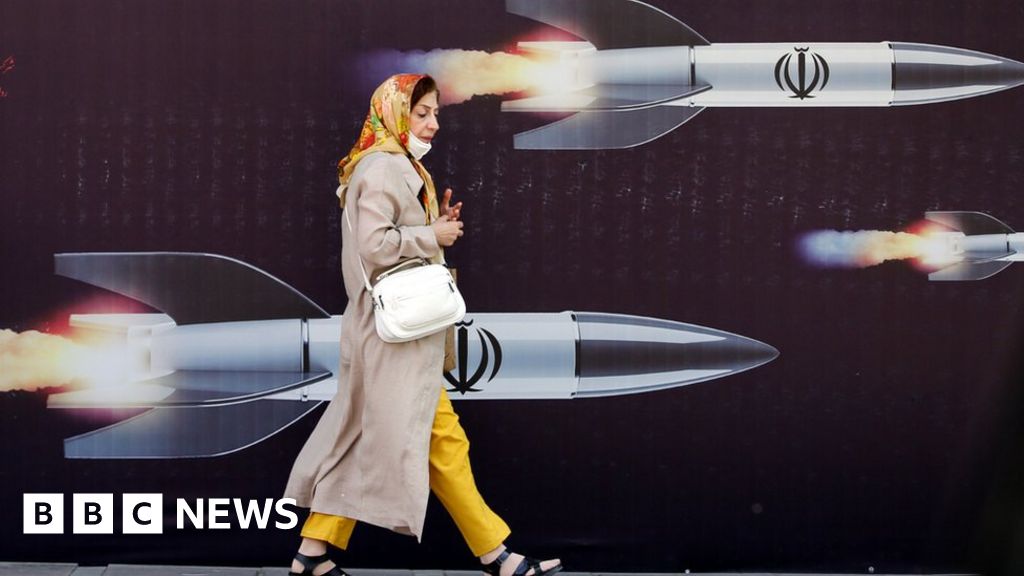
- By Lyse Doucet
- Chief International Correspondent
The latest round of the region's most dangerous rivalry seems over for now.
Israel has yet to officially acknowledge the attack in Iran early Friday morning.
Meanwhile, Iran's military and political leaders have downplayed, dismissed and joked that nothing has happened as a result.
Accounts of what kind of weapons were used on Friday and how much damage was caused are still conflicting and incomplete.
US officials are talking about a missile attack, but Iranian officials say the attacks in the central province of Isfahan and northwestern Tabriz were caused by small explosive drones.
Iran's Foreign Minister Hossein Amir-Abdullahian told the semi-official Tasnim news agency that « the downed micro air vehicles caused no damage and caused no casualties. »
But these simple quadcopters are Israel's calling card — its repeated use of them in covert operations inside Iran over the years.
This time their main destination was the central province of Isfahan, celebrated for its magnificent Islamic heritage.
However, of late, the province has become more famous for the Natanz nuclear facility, the Isfahan Nuclear Technology Center and a large airbase that was used during Iran's attack on Israel on April 14.
It's an industrial heartland housing factories that manufacture drones and ballistic missiles that were launched by the hundreds in Israel's direction last Sunday.
So a limited operation seems to have carried a powerful warning – Israel has the intelligence and assets to strike at will at the beating heart of Iran.
It was a very urgent message, confirming that Israel sent it earlier than after the start of the Jewish Passover as widely predicted by Israel watchers.
US officials have indicated that Israel targeted sites such as Iran's air defense radar system, which protects Natanz. There is still no definitive account of its success.
So this attack could also be an opening salvo. But it was an unexpected 85th birthday present for Iran's supreme leader, Ayatollah Ali Khamenei.
Israel's official silence gave Iran an important political seat in the final decision-making process. Whenever Tehran is attacked by its arch-enemy, Iran does not have to use its new rule with the risk of retaliating sharply, triggering a dangerous spiral of escalation.
Iran also sees it as its new power projection.
Hardline President Ibrahim Raisi did not mention these more recent events in his Friday speeches.
For the Islamic Republic, it's all about what it calls Operation True Promise — its unprecedented offensive against Israel last Sunday night. He praised what he called his country's « steely will. »
Iran has for years prided itself on its « strategic patience, » its policy of playing the long game rather than responding immediately and directly to any provocations.
Now, it triggers « strategic deterrence. » This new theory was prompted by an April 1 attack on its diplomatic compound in Damascus, which destroyed its embassy and killed seven Revolutionary Guards, including the region's most senior commander.
Iran's supreme leader is under pressure to draw a line as Israel ramps up its targets in the final six months of the bitter Gaza war.
In addition to attacking Tehran's assets, including weapons depots, buildings, bases and supply routes, Israel has also assassinated high-ranking officials in battlefields such as Syria and Lebanon.
Decades of hostility, previously played out in shadow wars and covert operations, erupted into open conflict.
Whatever the specifics of this latest tit-for-tat, both sides have a more fundamental priority: deterrence — a resolute determination to strike on its own soil not to happen again. If they do, they will have to pay and it will hurt.
For now, there is a sigh of relief in the region and in distant capitals.
Israel's latest move, under eager prodding from its allies to limit its retaliation, will ease these tensions for now. Everyone wants to stop a devastating war. But no one can doubt that any peace will not last.
The area is still burning.
The Gaza war is causing heavy Palestinian casualties.
Under pressure from its staunch allies, Israel has facilitated the delivery of much-needed aid, but the affected area is still on the brink of famine.
Israeli hostages have yet to come home, and ceasefire talks have stalled. Israel is still warning of coming battles in Rafah, Hamas's last stronghold – which aid chiefs and world leaders say will be another untold humanitarian disaster.
From Hezbollah's strongholds in Lebanon to Iran-aligned militias in Iraq and Syria to Yemen's Houthis, Iran's proxy network, known as the « Axis of Resistance, » is poised and still strikes daily.
In the past few weeks, the region's darkest, most dangerous days have all but changed.






